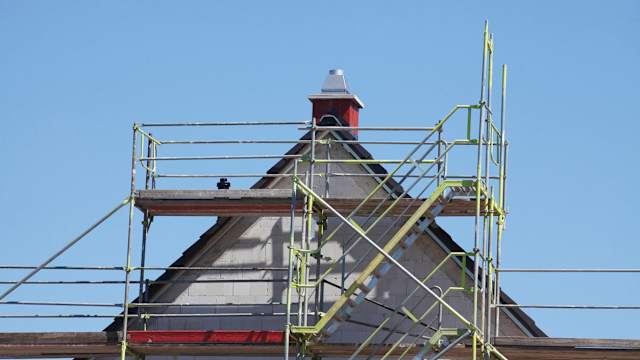Fixed-rate mortgages in Switzerland: important information at a glance
A fixed-rate mortgage lets you hedge against rising interest rates. What are the risks involved? What are the alternatives? Comparis provides an overview.

02.02.2026

iStock/PrathanChorruangsak
1. How do fixed-rate mortgages work?
With a fixed-rate mortgage, the interest rate is fixed over a certain term. The mortgage rates therefore remain the same over the specified period. The usual repayment terms are between 2–10 years. In certain cases, individual providers also offer terms of up to 15 or 20 years.
The mortgage is usually repaid at regular intervals. As a rule, you only pay the interest during the term. Full amortization is often only scheduled for the end of the term.
How long should I take out a fixed-rate mortgage for?
The term you should choose for your fixed-rate mortgage depends on your personal situation, your future plans and current interest rate trends. Our mortgage partner HypoPlus can help you find the right financing solution.
2. How does a fixed-rate mortgage differ from other mortgages?
Depending on your circumstances, a different type of mortgage may be better suited to your needs. The key differences are:
Saron mortgage: Saron mortgages often have terms of 1–5 years. The interest rate usually changes every three months.
Variable-rate mortgage: you can terminate a variable-rate mortgage at any time, provided you observe the notice period. The interest rate is usually higher than with fixed-rate and Saron mortgages.
Hybrid mortgages: splitting your mortgage up lets you combine different types of mortgages.
3. What are the advantages of a fixed-rate mortgage?
In the case of fixed-rate mortgages, the interest rates are fixed. This results in the following advantages:
Protection from rising interest rates
With a fixed-rate mortgage, you are protected from rising interest rates. Even if interest rates rise during the term, your agreed interest rate remains unchanged. A fixed-rate mortgage is therefore particularly useful when interest rates are low or if you expect interest rates to rise.
Stable costs
The cost of the mortgage remains stable and predictable. This gives you planning certainty for your budget – even if the interest rate situation on the market suddenly changes.
Is a fixed-rate mortgage the right choice for me?
Are you not expecting any big life changes during the mortgage term? Do you also value planning certainty over the long term? In that case, a mortgage with a fixed interest rate makes sense.
4. What are the disadvantages of a fixed-rate mortgage?
Depending on your circumstances and the market situation, a fixed interest rate carries various risks:
No advantage in the event of declining interest rates
With a fixed-rate mortgage, you will not be able to capitalize on a sudden dip in interest rates – at least not during the mortgage term.
Good to know: once the term has ended, banks set a new interest rate. The new interest rate is based on the current market situation. You may therefore have to roll over your mortgage or remortgage at a higher interest rate than the initially agreed fixed rate. You can minimize this risk by renewing your mortgage early.
Your personal circumstances change
The longer the mortgage term, the greater the risk of your income situation changing in the meantime – as a result of you losing your job or switching to part-time hours, for instance. Such changes can make repaying your mortgage difficult. A fixed-rate mortgage can also become a burden in the event of a divorce.
Limited flexibility
During the term, it is difficult or costly to switch to a different mortgage model or to a different lender. You can find more information in our article on terminating a mortgage early.
5. Current interest rates for fixed-rate mortgages
The following table shows the differences between the best mortgage rate negotiated by HypoPlus and the average benchmark rates of all lenders:
| Term | HypoPlus interest from | Average benchmark rate |
|---|---|---|
| 2 years | 0.78% | 1.22% |
| 3 years | 0.86% | 1.23% |
| 4 years | 1.02% | 1.32% |
| 5 years | 1.03% | 1.41% |
| 6 years | 1.19% | 1.48% |
| 7 years | 1.24% | 1.53% |
| 8 years | 1.27% | 1.60% |
| 9 years | 1.33% | 1.66% |
| 10 years | 1.34% | 1.79% |
| 12 years | 1.50% | 1.95% |
| 15 years | 1.68% | 2.06% |
| 20 years | 2.01% | 2.25% |
The calculation is based on a mortgage amount of CHF 750,000. Information correct as of 2 february 2026.
Indicative rates: buyer beware
The rates advertised by banks are not necessarily the best rates. They are average values and are used for indicative purposes only. They are calculated assuming a good credit rating and a good property.
6. Common questions about fixed-rate mortgages
The benchmark rate for a fixed-rate mortgage with a term of 10 years is currently 1.79% (as of 2 February 2026).
Our tip: don’t accept the first interest rate your bank offers you. There is usually a substantial difference between the officially advertised mortgage rates (benchmark rates) and the best negotiated rates.
The following example shows the savings potential based on a current quote from HypoPlus, the mortgage partner of Comparis, compared to the average benchmark rate:
| Benchmark rate (10 years) as of 2 February 2026 | 1.79% |
|---|---|
| Best rate negotiated by HypoPlus as of 2 February 2026 | 1.34% |
| Mortgage | CHF 750,000 |
| Rate difference per year | 0.45% |
| Saving per year | CHF 3,375 |
| Saving over the entire term | CHF 33,750 |
The minimum amount for a fixed-rate mortgage in Switzerland is usually 100,000 francs. This amount is applicable per fixed-rate mortgage and may vary slightly depending on the lender.
Yes, you can increase a fixed-rate mortgage if the bank agrees after checking your financial situation and the market value of the property. You can find more information about increasing your mortgage here.
You can generally only terminate a fixed-rate mortgage at the end of the agreed term. Early termination is usually associated with high costs. You can find more information about terminating a mortgage early here.
This article was first published on 28.05.2020





